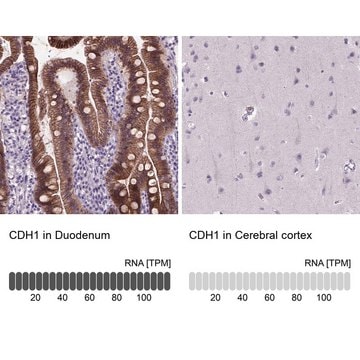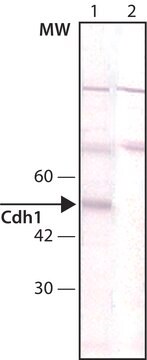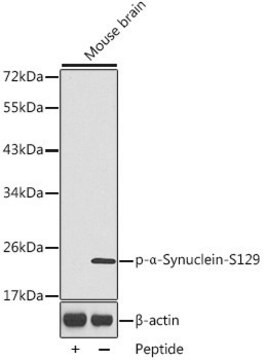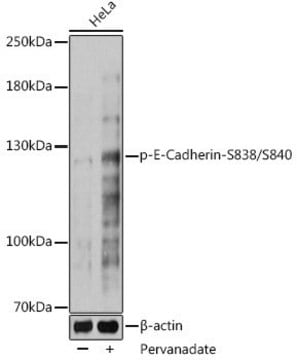CC43
Anti-Cdh1 (Ab-2) Mouse mAb (DH01)
liquid, clone DH01, Calbiochem®
Sign Into View Organizational & Contract Pricing
All Photos(1)
About This Item
UNSPSC Code:
12352203
NACRES:
NA.43
Recommended Products
biological source
mouse
Quality Level
antibody form
purified antibody
antibody product type
primary antibodies
clone
DH01, monoclonal
form
liquid
contains
≤0.1% sodium azide as preservative
species reactivity
human
manufacturer/tradename
Calbiochem®
storage condition
do not freeze
isotype
IgG1
shipped in
wet ice
storage temp.
2-8°C
target post-translational modification
unmodified
Gene Information
human ... CDH1(999)
General description
Anti-Cdh1 (Ab-2), mouse monoclonal, clone DH01, recognizes the ~55 kDa Cdh-1 protein in Rat-1 cells. It is validated for Western blotting and immunoprecipitation.
Purified mouse monoclonal antibody generated by immunizing BALB/c mice with the specified immunogen and fusing splenocytes with Sp2/0 mouse myeloma cells. Recognizes the ~55 kDA Cdh1 protein.
Recognizes the ~55 kDa Cdh-1 protein in Rat-1 cells.
Immunogen
Human
recombinant human Cdh1 protein
Application

Immunoblotting (1 g/ml)
Immunoprecipitation (2 g/mg protein lysate)
Packaging
Please refer to vial label for lot-specific concentration.
Warning
Toxicity: Standard Handling (A)
Physical form
In 10 mM PBS, 0.2% BSA, pH 7.4.
Analysis Note
Negative Control
Normal mouse serum
Normal mouse serum
Positive Control
Junkat or LS174T cells
Junkat or LS174T cells
Other Notes
Does not cross-react with other WD repeat containing proteins, including Cdc20. Antibody should be titrated for optimal results in individual systems.
Kramer, E.R., et al. 2000 Mol. Biol. Cell11, 1555.
Petersen, B.O., et al. 2000 Genes Dev.14, 2330.
Pfleger, C.M., et al. 2001 Genes Dev.15, 1759.
Sorensen, C.S., et al. 2001 Mol. Cell Biol.21, 3692.
Gieffers, C., et al. 1999 Proc. Natl. Acad. Sci. USA96, 11317.
Visintin, R., et al. 1997 Science278, 460.
Petersen, B.O., et al. 2000 Genes Dev.14, 2330.
Pfleger, C.M., et al. 2001 Genes Dev.15, 1759.
Sorensen, C.S., et al. 2001 Mol. Cell Biol.21, 3692.
Gieffers, C., et al. 1999 Proc. Natl. Acad. Sci. USA96, 11317.
Visintin, R., et al. 1997 Science278, 460.
Legal Information
CALBIOCHEM is a registered trademark of Merck KGaA, Darmstadt, Germany
Not finding the right product?
Try our Product Selector Tool.
Storage Class Code
11 - Combustible Solids
WGK
WGK 1
Flash Point(F)
Not applicable
Flash Point(C)
Not applicable
Certificates of Analysis (COA)
Search for Certificates of Analysis (COA) by entering the products Lot/Batch Number. Lot and Batch Numbers can be found on a product’s label following the words ‘Lot’ or ‘Batch’.
Already Own This Product?
Find documentation for the products that you have recently purchased in the Document Library.
Yu-Liang Kuo et al.
The EMBO journal, 25(8), 1741-1752 (2006-04-08)
The human T-lymphotropic virus type 1 (HTLV-1) Tax binds the anaphase promoting complex (APC) and activates it ahead of schedule. Here, we show that APC activation by Tax induces rapid senescence (tax-IRS) independently of p53 and pRB. In response to
Savvas C Pavlides et al.
Cell cycle (Georgetown, Tex.), 15(7), 931-947 (2016-03-11)
We previously reported that aberrant TGF-β/Smad2/3 signaling in endometrial cancer (ECA) leads to continuous ubiquitylation of p27(kip1)(p27) by the E3 ligase SCF-Skp2/Cks1 causing its degradation, as a putative mechanism involved in the pathogenesis of this cancer. In contrast, normal intact
W Liu et al.
Oncogene, 30(1), 21-31 (2010-08-31)
Inactivation of von Hippel-Lindau tumor-suppressor protein (pVHL) is associated with von Hippel-Lindau disease, an inherited cancer syndrome, as well as the majority of patients with sporadic clear cell renal cell carcinoma (RCC). Although the involvement of pVHL in oxygen sensing
Debjani Pal et al.
Cell death & disease, 11(4), 298-298 (2020-04-30)
APC/CCdh1 is a ubiquitin ligase with roles in numerous diverse processes, including control of cellular proliferation and multiple aspects of the DNA damage response. Precise regulation of APC/CCdh1 activity is central to efficient cell-cycle progression and cellular homeostasis. Here, we
Maria Giulia Manzione et al.
Molecular biology of the cell, 31(6), 419-438 (2020-01-23)
Chromosome segregation during mitosis is antagonistically regulated by the Aurora-B kinase and RepoMan (recruits PP1 onto mitotic chromatin at anaphase)-associated phosphatases PP1/PP2A. Aurora B is overexpressed in many cancers but, surprisingly, this only rarely causes lethal aneuploidy. Here we show
Our team of scientists has experience in all areas of research including Life Science, Material Science, Chemical Synthesis, Chromatography, Analytical and many others.
Contact Technical Service








